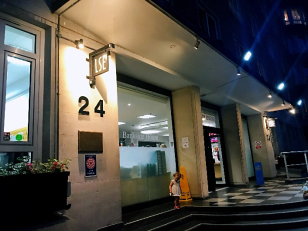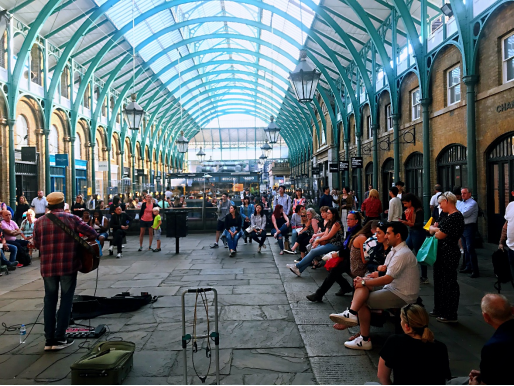Insights in London
Wang Zihang (Major in Economics and Finance)
During the past three weeks, I have had a great time here in London. Ihavelearned more about economics and politics,gotten to know the local people,and enjoyedLondon’s tourist attractions, scenery and culture.
Studyingat LSEhasgiven me a more profound insight ofBritisheconomics and politics. Although the LSE100 Program seemedtonot havea great focus on academic research, itwas clear to me thatLSE wantsall ofits undergraduate students to learn the basics.To me, the highlight was that I got a glimpse of British left-wing valuesin economics and politics. These values can be found in the lectures and seminars,as well as in the teaching materials.
In my opinion, the most helpful part of the LSE Program wasthat I got to practise necessaryskills, including essay writing, negotiation, and presentation. The lecturers gave very useful instructionson how to write a good essayand always provideddetailed feedbackon your work. The negotiations we practised were neither like a meeting of the United Nations nor a multilateral negotiation of temporary emergency, which meantthat the procedures often tended tolead to confusion rather than order, especially in deliberations on draft resolutions and amendments, as well as the voting procedure. However, itwas still a great opportunity for me to practice my negotiating skills, learn to exchange interests and make compromises, and maximize my achievements. It wasdefinitely challenging, but it was all worth it for thesense of accomplishmentthat you would get after a successful negotiation. ThepresentationskillsI learned have been helpful too, and Inow have a better command of how tomake my presentations more convincing and interesting for the audience.
As I waswandering around the campus of LSE, if it canreallybe calledacampus, looking at the beautiful buildings and passing through the shelves of books in library,I was filled with a sense of appreciation and admiration. Although I was not able to fully understandthe historical, cultural, political, andacademic impact LSEhas had, I havegained an elementaryunderstanding ofthe school.

Outside life on campus, Ialso greatly enjoyedliving in London. By visiting museums, galleries, parks,andhistorical places of interest, as well as watching musicals, going toconcerts, and interacting with the local people, Iwas able toexperience the Britishlifestyle.
LSE Bankside House, where we stayed, is on the bank ofRiverThames in City of London, the financial centre of Greater London and the UK,right next to City of Westminster, the political centre of the country. There arecountless interestingplaces to visit in City of London and City of Westminster, which I was busy touring every weekday after class, as well as every weekend.
Tate Modern is a famous modern art gallery just next to Bankside House. I visited Tate Modern twice, and saw nearly all its exhibits.I often find modern art difficult to understand, and I had to read the introductions tobe able to see the underlying meaning and ideas behind the exhibits. However, gradually, I was able to discover and identify the special beauty of these abstract and elusive works and learned to enjoy them.
TheNation Gallery andtheCourtauld Gallery are also great places to appreciate art. Thanks to these galleries, I was given a brief yet comprehensive view of western art, fromtheMiddle Age to modern time.

I was amazed by theexquisitehistoricaltreasuresat theBritish Museum and the Museum of London and the exhibitionsat the Tower of London reminded of Shakespeare and his historical plays. While visiting Highgate Cemetery, I gave my respect to the great mentor of communism, Karl Marx.
On a Thursday afternoon after class, I went to the Parliament House to watch the debate of the Parliament. The debate was far from what I had imagined, as I had expectedthedebates in the Parliament to be very serious. However, what I saw was quite the opposite. The members (or lords) behavedin a casual way;many of themwerechatting or looking at their mobile phones whileothers were speaking. Somewouldeven shout to show their disagreement,both in the House of Commonsand the House of Lords. I still cannot believe thatthis is how important decisionsin the UKare made!I guess this is a feature of Britishpolitics.
One day, when passing by Downing Street, I saw a troop of men holdingplacards and handing out leaflets about communism. Out of curiosity, I approached them.It turned out that they were from the New Communist Party of Britain, which split from the Communist Party of Great Britain. After a nice talk, they invited me and other comrades to visit their headquarters.It was the first time that I hadeverbeen called ‘comrade’! That weekend, two friends and I went to their headquarters where we enjoyed apleasant evening. Their offices were very old and plain, both onthe outsideand the inside; it seemed the party was short of funds.However, even inthis difficult situation, they still holdonto their faith that communism will finallyprevail all over the world. On that evening, we talked about the International Communist Movement, communism in the former Soviet Union and China, the Labour Party and Jeremy Corbyn, andDonaldTrump. It really was a magical experience to communicate with comradesfrom the other side of theworld.
WhenDonaldTrump came to Britain for his visit, protests and demonstrations were held allacross London.That morning, a political organizationprotestingagainst Trump flew a huge balloon ofTrumpas a babyover Parliament Square. The demonstrations beganat Portland Square at noonand arrivedat Trafalgar Square in the evening, where the rally then began. Many organizations and citizens were holdingplacards and handing out leaflets, allin protest of Trump. That was the seconddemonstration that week,withthefirstonebeing the famous Pridein London in support of LGBT rights.Pride in London was an interesting demonstration too, in the way thattheslogans andoutfits oftheparticipants were full of creativity, leaving me with a deep impression.
One evening at the pub besides Bankside House, I watched the semi-final of the World Cup with English football fans, cheering for England together. Although England eventuallylost,I had a nice evening, drinkingrum and experiencing the charm of football with the enthusiastic fans.
I also spent my evenings going to concerts, musicals and operas. I went to Royal Albert Hall to listen to the BBC Symphony Orchestra, watched aFalstaff verydifferent from Shakespeare’s attheRoyal Opera House, and enjoyed brilliant musicals such asThe Phantom of The OperaandLes Misérablesat West Endtheatre. Thesevenues are very different from those in China; theyare traditionally decorated,just like what Ihave read about them in novels. Besides this, I also went to the famous British Summer Time at Hyde Park, during which Bruno Mars and Paul Simon, among others, performed. It was the first time Ihad ever been to a music festival. Althoughthe food available at the festival, or ratherBritish food in general,does not really suit my taste,seeing such world-class artistsperform live was something special.
At St. Paul’s Cathedral and Westminster Abbey, Itook part in the evensongservice. I did not praylike some of the others attending the service, as it isnot my belief, but I respected and admired their devotion to their God. Bothof these iconic buildings were magnificent and resplendently decorated, accentuating the tininess of human beings.
One Sunday, I went to theSpeakers’ Corner inHyde Park to experience the tradition of British democracy.The place was crowdedandpeople had separatedinto different groups todiscuss different topics. Almost all the topics werein regard to the most sensitive problems of politics, for instance, race, immigration, Brexit, Metoo,andreligion. However,while listening to the debatesI got the impression thatthose debating had difficulties to see past their own positionand opinions, whichin Chinese is described as ‘letting the butt govern the head’.As a result, many of the debates fell into chaos, and no one succeeded in persuading the others.